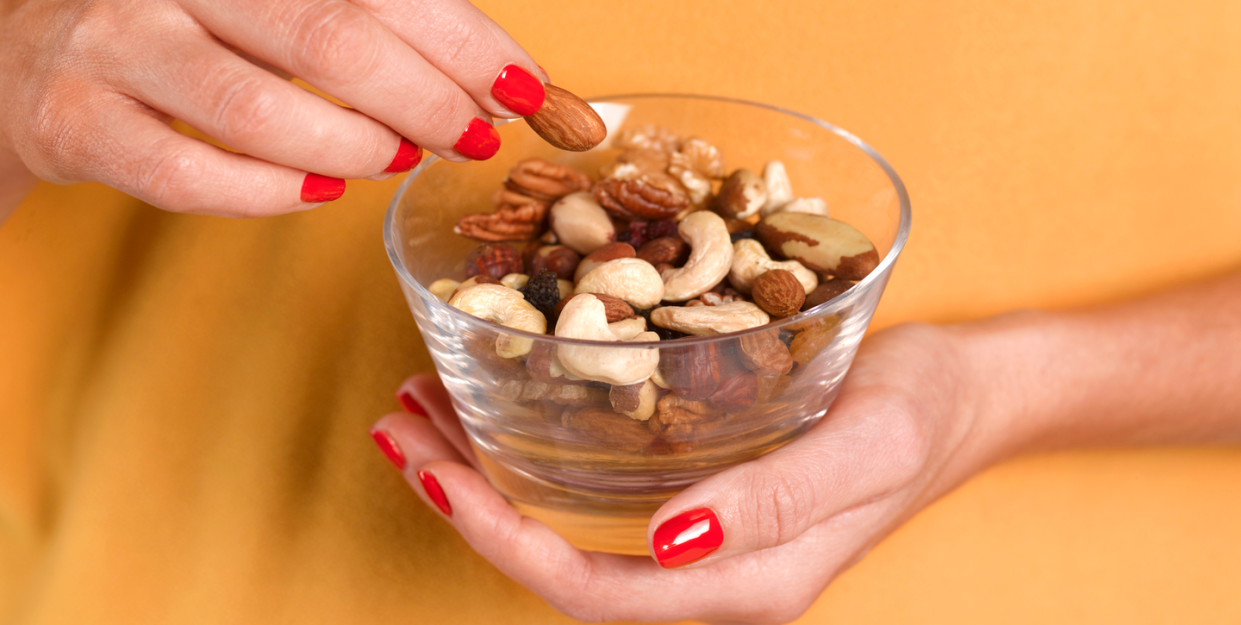Nuts Are Super Healthy, But There Are Side Effects of Eating Way Too Many

You already know nuts are incredibly healthy. The crunchy snack is associated with better heart health, lower cholesterol, and even weight loss. “The benefits of nuts definitely outweigh any other drawbacks or cons,” says Jerlyn Jones, R.D.N., L.D., spokesperson for the Academy of Nutrition and Dietetics and owner of The Lifestyle Dietitian.
Nuts are rich in protein, fiber, healthy fats, vitamins, minerals, and antioxidants. They can help boost your energy, and may even play a role in longevity, Jones says. Plus, they’re easy to eat on their own or incorporate into various dishes—which is why you should never feel bad about reaching for a handful of the delicious super-snacks. But by reaching, and reaching, and reaching, there are a few potential concerns.
Jones warns that it’s easy to eat too many nuts, especially because they’re so snackable. Most of us don’t stick to the recommended daily serving size, she says, noting that a handful is a good rough measure for the right serving (about 1/4 cup). “You want to be mindful of how many nuts you’re eating per day,” Jones says.
So, is it healthy to eat nuts every day? It can be—but there are three distinct ways overdoing it may negatively impact your health. Here’s what you should keep in mind:
You could possibly gain weight.
Because nuts are so filling, they can help aid your weight loss goals—but there’s a caveat: This only applies if you consume a moderate number of nuts. Eat more than the recommended handful, and you might actually start to gain weight.
That’s because nuts are calorie-dense, Jones says, meaning they contain more energy per ounce than many other foods (you can thank all the healthy fats for that!). For example, 1 ounce of almonds contains about 160 calories—so even if you just double your serving, you’re packing in 320 calories for a snack. That could result in weight gain if you don’t account for the extra calories eaten throughout your day.
That said, if you love nuts and simply fit the extra calories into a balanced diet overall, you shouldn’t have too many issues. For example, if you’re having a low-calorie salad and want to bulk it up with extra nuts because it won’t be filling otherwise, by all means add the almonds to round out your meal.
Gas, bloating, and digestive issues may occur.
If you ever felt gassy or bloated after eating nuts, you’re not alone. It’s a common side effect, thanks to compounds in nuts called phytates and tannins, which make them difficult to digest. And eating too much fat, which is found abundantly in nuts, in a short period of time can lead to diarrhea, says Alan R. Gaby, M.D., author of Nutritional Medicine.
How to prevent these unpleasant problems? Stick to the recommended daily serving size, or opt for sprouted nuts. These have already started to turn into plants, making them easier to digest, says certified diabetes educator Lily Nichols, R.D.N.
In rare cases, too many Brazil nuts can cause selenium poisoning.
Brazil nuts are naturally rich in selenium—in fact, a 1-ounce serving (six to eight nuts) contains nearly 10 times the recommended daily amount of selenium (55 micrograms). Selenium poisoning can make your nails brittle, cause your breath to smell, and even trigger aching muscles and joints. (Note: Selenium overload is specific to Brazil nuts, so no need to worry about this problem when eating other types.)
“If you’re only eating a minimum amount of Brazil nuts, you don’t have to worry about too much selenium in your body,” Jones says. She recommends eating only up to four Brazil nuts a day, and possibly dropping that to four every other day to err on the side of caution.
The solution to all of these issues is simply to watch the number of nuts you eat. If you tend to graze mindlessly, Jones recommends creating a pile of shells so you can keep track of exactly how many you’ve had. You can also measure out a portion to keep your serving sizes in check.
Support from readers like you helps us do our best work. Go here to subscribe to Prevention and get 12 FREE gifts. And sign up for our FREE newsletter here for daily health, nutrition, and fitness advice.
You Might Also Like

